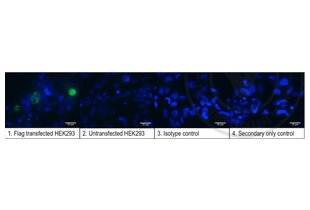-
- Antigène Tous les produits DYKDDDDK Tag
- DYKDDDDK Tag
- Reactivité
- Veuillez nous consulter SVP
-
Hôte
- Souris
-
Conjugué
- Cet anticorp DYKDDDDK Tag est non-conjugé
-
Application
- Western Blotting (WB), Immunoprecipitation (IP), Immunofluorescence (IF)
- Séquence
- DYKDDDDK
- Immunogène
- A synthetic peptide DYKDDDDK conjugated to KLH.
- Isotype
- IgG1
-
-
- Indications d'application
- WB (1:1000-10000), IP (1:100-500), IF (1:200-1000). Other applications have not been tested. The optimal dilutions should be determined by end user.
- Restrictions
- For Research Use only
-
- by
- Reveal Biosciences
- No.
- #028889
- Date
- 07.11.2013
- Antigène
- Numéro du lot
- L21/2013G
- Application validée
- Immunofluorescence
- Contrôle positif
- HEK293 cells transfected with DYKDDDDK Tag
- Contrôle négative
- Untransfected HEK293 cells
- Conclusion
- Signal was detected in positive control samples but not in negative control samples.
- Anticorps primaire
- Antibody: DYKDDDDK Tag antibody
- Catalog number: ABIN1112984
- Lot number: L21/2013G
- Anticorps secondaire
- Antibody: Goat anti-mouse IgG (H+L) IF488 conjugated antibody
- Lot number: S6/2013S
- Full Protocol
- HEK293 cells were grown directly on coverslips and transfected with a DYKDDDDK tagged protein.
- Cells were fixed with 4% paraformaldehyde in PBS for 15 min at room temperature (RT).
- Fixed cells were rinsed three times in PBS for 5 min each at RT.
- Cells were blocked in 1 X PBS / 5% normal goat serum / 0.3% Triton X-100 for 20 min at RT.
- Cells were incubated with primary antibody diluted 1:100 in Universal Antibody Dilution Buffer (Electron
- Microscopy Sciences, 25885-05) overnight at 4°C.
- Cells were rinsed three times in PBS for 5 min each at RT.
- Cells were incubated with secondary antibody diluted 1:150 in Universal Antibody Dilution Buffer
- (Electron Microscopy Sciences, 25885-05) for 60 min at RT in dark.
- Cells were rinsed three times in PBS for 5 min each at RT.
- Coverslips were mounted on slides with Fluoro-Gel II with DAPI (Electron Microscopy Sciences Cat. No: 17985-50).
- Stained cells were imaged with an EIDAQ 100 fluorescent microscope.
- Notes
- None
Validation #028889 (Immunofluorescence)![Testé avec succès 'Independent Validation' signe]()
![Testé avec succès 'Independent Validation' signe]() Validation Images
Validation Images![Figure 1: : Immunofluorescence analysis of cultured cells using DYKDDDDK Tag antibody (Catalog number ABIN1112984, Lot number L21/2013G). Flag is present in the positive control (HEK293 cells transfected with DYKDDDDK Tag panel 1, transfected cells are indicated by green fluorescent staining) and absent from the negative control (untransfected HEK293 cells panel 2). No staining was observed in the isotype (panel 3) and secondary only (panel 4) controls. DAPI was used as a nuclear counterstain (indicated by blue fluorescent staining). Scale bar = 25 µm.]() Figure 1: : Immunofluorescence analysis of cultured cells using DYKDDDDK Tag antibody (Catalog number ABIN1112984, Lot number L21/2013G). Flag is present in the positive control (HEK293 cells transfected with DYKDDDDK Tag panel 1, transfected cells are indicated by green fluorescent staining) and absent from the negative control (untransfected HEK293 cells panel 2). No staining was observed in the isotype (panel 3) and secondary only (panel 4) controls. DAPI was used as a nuclear counterstain (indicated by blue fluorescent staining). Scale bar = 25 µm.
Protocole
Figure 1: : Immunofluorescence analysis of cultured cells using DYKDDDDK Tag antibody (Catalog number ABIN1112984, Lot number L21/2013G). Flag is present in the positive control (HEK293 cells transfected with DYKDDDDK Tag panel 1, transfected cells are indicated by green fluorescent staining) and absent from the negative control (untransfected HEK293 cells panel 2). No staining was observed in the isotype (panel 3) and secondary only (panel 4) controls. DAPI was used as a nuclear counterstain (indicated by blue fluorescent staining). Scale bar = 25 µm.
Protocole -
- Format
- Liquid
- Buffer
- PBS (pH7.4), 50% Glycerol and 0.02% Sodium Azide.
- Agent conservateur
- Sodium azide, Thimerosal (Merthiolate)
- Stock
- 4 °C
- Stockage commentaire
- Store at 2-8 °C for 1 month. Or aliquot and store at -20 °C or below for long term. Avoid repeated freeze and thaw cycles.
-
- Antigène
- DYKDDDDK Tag
- Autre désignation
- Flag Tag (DYKDDDDK Tag Produits)
- Classe de substances
- Tag
- Sujet
- DYKDDDDK-Tag, or DYKDDDDK octapeptide, is a polypeptide protein tag that can be added to a protein using recombinant DNA technology. It can be used for affinity chromatography, then used to separate recombinant, overexpressed protein from wild-type protein expressed by the host organism. The peptide sequence of the DYKDDDDK-Tag is: N-DYKDDDDK-C (1012 Da). It can be used in conjunction with other affinity tags, for example a polyhistidine tag (His-tag), HA-tag or myc-tag. It can be fused to the C-terminus or the N-terminus of a protein.
-
Vous êtes ici:


 (1 validation)
(1 validation)



